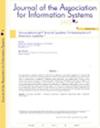揭示移动应用使用对用户健康状况的影响:来自资源保护理论的见解
IF 5.5
3区 管理学
Q1 COMPUTER SCIENCE, INFORMATION SYSTEMS
引用次数: 0
摘要
许多研究已经记录了技术使用增加所产生的不良后果,并主张将减少这种使用作为一种合理的补救措施。然而,鉴于越来越多的证据证明用户在个人和职业生活中越来越依赖技术,这样的建议往往是不可行的,而且过于简单化。基于资源守恒(COR)理论,我们构建了一个研究模型,以解释移动应用使用的广度和深度如何影响用户的无手机恐惧症和睡眠剥夺,从而对用户的健康状况产生负面影响。我们还考虑了身体活动在减轻移动应用程序使用对用户健康的影响方面的调节作用。我们通过调查5842名受访者收集的数据验证了我们的假设。实证结果表明:(1)无手机恐惧症受手机应用使用广度的正向影响,受手机应用使用深度的负向影响;(2)睡眠剥夺受手机应用使用广度的负向影响,受手机应用使用深度的正向影响;(3)睡眠剥夺和无手机恐惧症对用户健康状况有负向影响。然而(4)体育活动减弱了移动应用程序使用对睡眠剥夺的影响,而不是无手机恐惧症。本研究的发现不仅通过揭示移动应用程序使用模式和身体活动对用户健康的影响,丰富了现有的关于移动应用程序使用对健康结果的文献,而且还告诉从业者如何校准使用的广度和深度,以及鼓励身体活动,可以促进用户的健康习惯。本文章由计算机程序翻译,如有差异,请以英文原文为准。
Unraveling the Effects of Mobile Application Usage on Users' Health Status: Insights from Conservation of Resources Theory
Numerous studies have documented adverse consequences arising from increased technology usage and advocated for a reduction in such usage as a plausible remedy. However, such recommendations are often infeasible and oversimplistic given mounting evidence attesting to users’ growing reliance on technology in both their personal and professional lives. Building on conservation of resources (COR) theory, we construct a research model to explain how mobile application usage, as delineated by its breadth and depth, affects users’ nomophobia and sleep deprivation, which can have negative impacts on users’ health status. We also consider the moderating influence of physical activity in mitigating the effects of mobile application usage on users’ health. We validated our hypotheses via data collected by surveying 5,842 respondents. Empirical findings reveal that (1) nomophobia is positively influenced by mobile application usage breadth but negatively influenced by mobile application usage depth, (2) sleep deprivation is negatively influenced by mobile application usage breadth but positively influenced by mobile application usage depth, and (3) sleep deprivation and nomophobia negatively impact users’ health status, whereas (4) physical activity attenuates the impact of mobile application usage on sleep deprivation but not nomophobia. The findings from this study not only enrich the extant literature on the health outcomes of mobile application usage by unveiling the impact of mobile application usage patterns and physical activity on users’ health but they also inform practitioners on how calibrating usage breadth and depth, along with encouraging physical activity, can promote healthy habits among users.
求助全文
通过发布文献求助,成功后即可免费获取论文全文。
去求助
来源期刊

Journal of the Association for Information Systems
工程技术-计算机:信息系统
CiteScore
11.20
自引率
5.20%
发文量
33
审稿时长
>12 weeks
期刊介绍:
The Journal of the Association for Information Systems (JAIS), the flagship journal of the Association for Information Systems, publishes the highest quality scholarship in the field of information systems. It is inclusive in topics, level and unit of analysis, theory, method and philosophical and research approach, reflecting all aspects of Information Systems globally. The Journal promotes innovative, interesting and rigorously developed conceptual and empirical contributions and encourages theory based multi- or inter-disciplinary research.
 求助内容:
求助内容: 应助结果提醒方式:
应助结果提醒方式:


